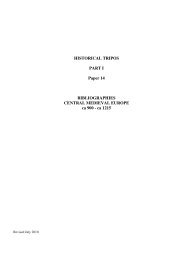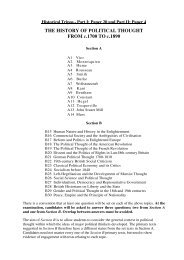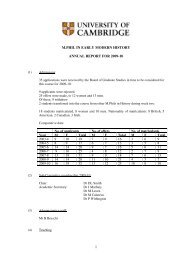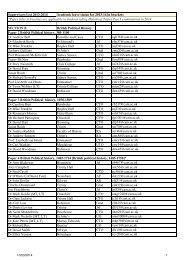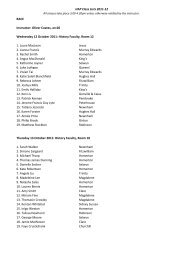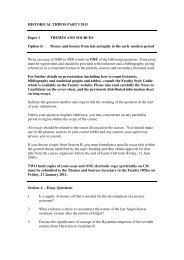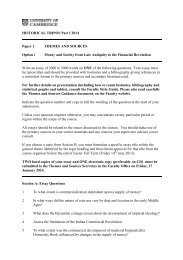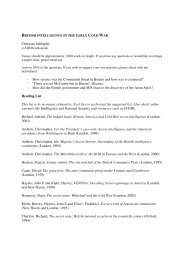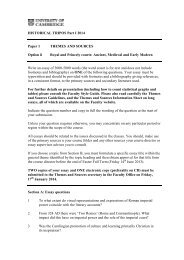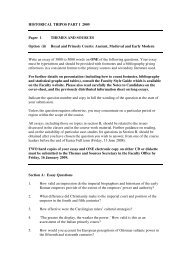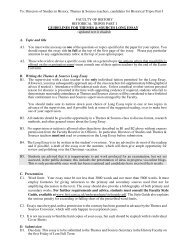Course Handbook - Faculty of History - University of Cambridge
Course Handbook - Faculty of History - University of Cambridge
Course Handbook - Faculty of History - University of Cambridge
Create successful ePaper yourself
Turn your PDF publications into a flip-book with our unique Google optimized e-Paper software.
11. FAILURE IN PART I<br />
In the case <strong>of</strong> one or two fail marks (58 or below) the External Examiner is automatically asked by<br />
the Secretary <strong>of</strong> the MPhil Sub-Committee to examine and enter a third mark for the essay.<br />
However, fail marks submitted by the External Examiner acting as a regular essay examiner will be<br />
moderated by a third marker appointed by the Secretary and confirmed by the MPhil Sub-<br />
Committee sitting as Board <strong>of</strong> Examiners. The external examiner or third reader will examine and<br />
award marks independently, without reference to the marks already awarded. Whenever possible,<br />
the third reader’s mark should give a clear recommendation <strong>of</strong> Pass or Fail. A third mark, which is a<br />
failing mark results in failure <strong>of</strong> this element, however a third mark which is a marginal fail (59) will<br />
result in a fail if the other mark is a fail, or a marginal fail if the other mark is a 59 or a passing<br />
mark.<br />
FAILURE IN COURSE ELEMENTS WORTH 10% OR MORE, OR MARGINAL FAILURE<br />
IN COURSE ELEMENTS WORTH 20% OR MORE CONSTITUTES FAILURE IN THE<br />
COURSE OVERALL. Candidates who fail at this stage will be notified as soon as possible so that<br />
they may withdraw from the course. The MPhil Sub-Committee sitting as Board <strong>of</strong> Examiners will<br />
make a recommendation to this effect to the Degree Committee <strong>of</strong> the <strong>Faculty</strong> <strong>of</strong> <strong>History</strong>. There are<br />
no vivas for Part I examinations even in the case <strong>of</strong> outright failure. The Board <strong>of</strong> Graduate Studies<br />
also allows the Degree Committee discretion in the case <strong>of</strong> certain Part I failures to allow a<br />
candidate to submit a dissertation for a Certificate <strong>of</strong> Postgraduate Study.<br />
The results <strong>of</strong> all possible permutations <strong>of</strong> problematic marks are listed below:<br />
Original Marks Third Reader’s Mark Outcome<br />
marginal fail marginal fail = marginal fail / viva<br />
pass fail = marginal fail / viva<br />
pass = pass<br />
marginal fail fail = fail<br />
marginal fail marginal fail = marginal fail viva<br />
pass = marginal fail / viva<br />
marginal fail fail = fail<br />
fail marginal fail = marginal fail<br />
pass = marginal fail<br />
fail fail = fail<br />
pass marginal fail = marginal fail<br />
pass = pass<br />
fail fail = fail<br />
fail marginal fail = fail<br />
pass = marginal fail<br />
12. MARGINAL FAIL MARKS IN THE DISSERTATION (PART II)<br />
The mark <strong>of</strong> 59 is a marginal fail mark, which is possibly redeemable by evidence <strong>of</strong> more than<br />
borderline performance overall in the work submitted in Part I <strong>of</strong> the course. In giving such a mark<br />
examiners would indicate that the dissertation alone is not evidence enough to pass the course, but<br />
that it is sufficiently close that evidence <strong>of</strong> reasonably strong performance elsewhere in the course<br />
would warrant the award <strong>of</strong> the MPhil degree.<br />
In the case <strong>of</strong> one examiner awarding a Marginal Fail (59) and the other a Pass (60 or above), the<br />
dissertation will be marked by a third reader (normally the External Examiner). The third reader<br />
will examine and award marks independently, without reference to the marks already awarded.<br />
22




